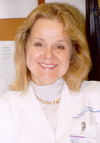Chavis probes health link between body, eyes
by Dick PetersonPublic Relations
They say eyes are windows to the soul. Storm Eye’s Pamela Chavis, M.D., also sees them as windows to the body.
 Dr.
Pamela Chavis
Dr.
Pamela Chavis
“You look at the blood vessels at the back of the eye and you get a good idea of what’s going on in blood vessels of similar size in the rest of the body,” she said. “You examine an eye and what you see there can take you into so many medical specialties.” She cited arthritis, diabetes, hypertension, myasthenia gravis and multiple sclerosis as examples of diseases that affect the health of the eye.
She says it’s that connection between the eyes and the rest of the body that led to her decision to choose a medical ophthalmology subspecialty.
Chavis is MUSC’s newest neuro-ophthalmologist, here since Sept. 1 from Virginia Commonwealth University. “I love being a doctor,” she said unequivocally. “I like the science and I have always wanted to take care of people.”
And what about the Storm Eye Institute?
“It’s a great job at a wonderful institution with a superb reputation outside this area.”
Chavis earned her medical degree from the University of Medicine and Dentistry of New Jersey (UMDNJ), served her internship at St. Vincent’s Hospital and Medical Center, New York City, and residency in neurology at Columbia Presbyterian Medical Center and in ophthalmology at UMDNJ. She also performed fellowships in neuro-ophthalmology at Columbia Presbyterian and Bascom Palmer Eye Institute in Miami, Fla.
She has held faculty positions at UMDNJ, King Saud University in Saudi Arabia, and at the Medical College of Virginia (now Virginia Commonwealth University).
Beyond neuro-ophthalmology, Chavis has an interest in alternative medications and is a resource for information on herbal and drug interactions. “Alternative medications can be powerful and wonderful in many ways, but it is important to know when they are not so wonderful and when they can react adversely with other medications,” Chavis said. She cites digitalis and cyclosporin as powerful medications that are derived from natural sources.
Chavis said she welcomes involvement in local support groups related to neurological diseases affecting the eyes. She is a member of the medical advisory boards of the Lupus Foundation, the Myasthenia Gravis Foundation of America, and the American Behcet’s Disease Association. She has written for the National Association for Rare Diseases and is writing for the National Association for the Visually Disabled.
“Right now, I’m busy,” she said, pointing to a stack of patient charts she has inherited as a new MUSC clinician. “But it’s challenging and fun. The residents and staff here have been great.”
In her off-campus life, Chavis is a master gardener, who for the time
being is giving herself a season in the Lowcountry to adjust to the climate
and learn about the local flora.
Friday, Nov. 12, 2004
Catalyst Online is published weekly, updated
as needed and improved from time to time by the MUSC Office of Public Relations
for the faculty, employees and students of the Medical University of South
Carolina. Catalyst Online editor, Kim Draughn, can be reached at 792-4107
or by email, catalyst@musc.edu. Editorial copy can be submitted to Catalyst
Online and to The Catalyst in print by fax, 792-6723, or by email to petersnd@musc.edu
or catalyst@musc.edu. To place an ad in The Catalyst hardcopy, call Community
Press at 849-1778.